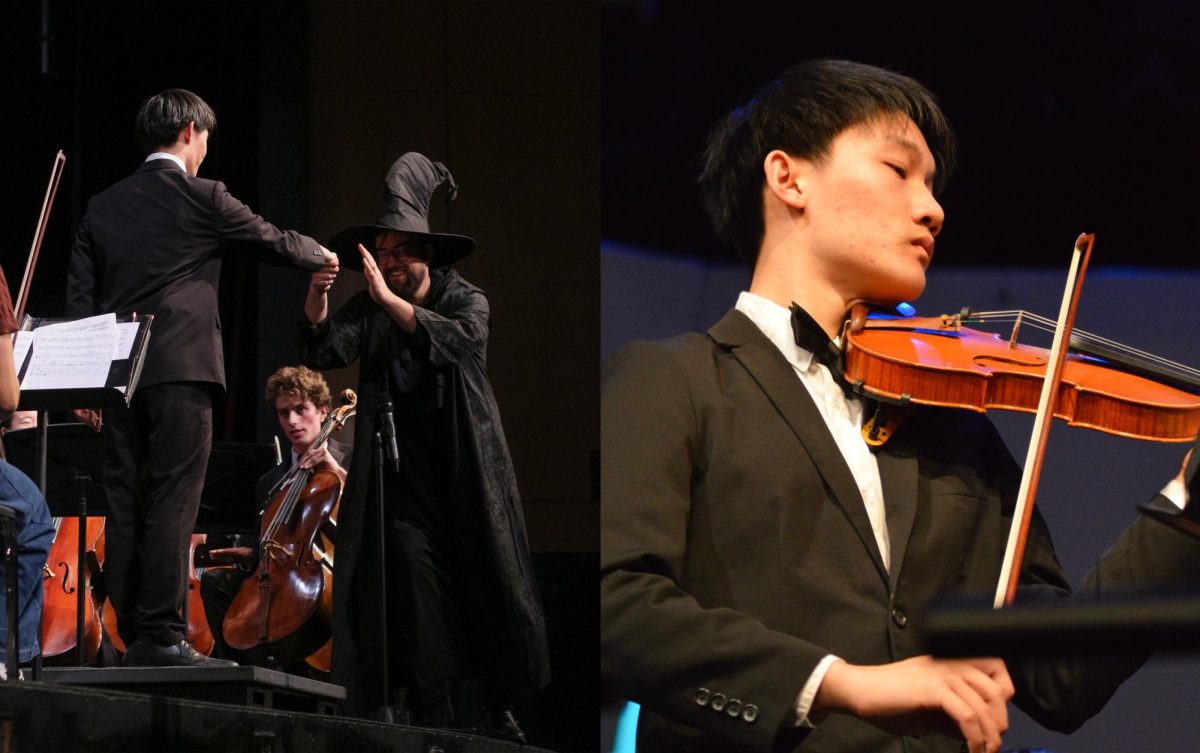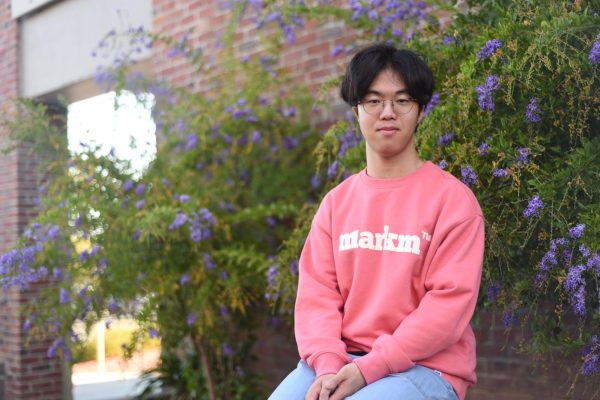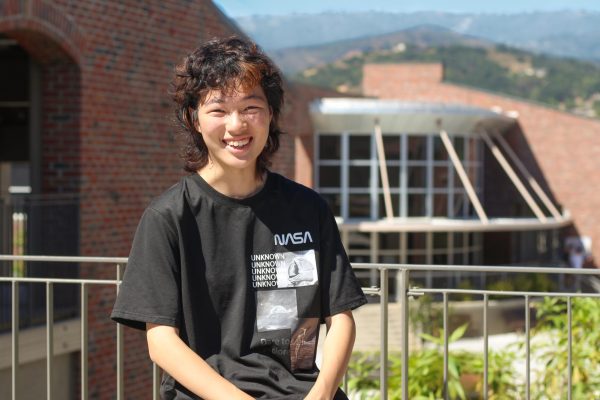The track begins with thunderous drums and a tense, repeating musical phrase, called a motif, that evokes the sounds of bombs dropping. Ten seconds in, the instrumentation launches into chaos — electric guitars, synthesizers, strings and a choir, woven together by an unconventional 16/17 time signature to create a cacophony of sound.
“WarZone,” a piece composed by senior William Zhang, includes many aspects of William’s distinctive musical style, like the unconventional time signature, a large ensemble of instruments and a simple motif. This motif was the inspiration for “Turbulent Souls,” one of the pieces MVHS Chamber Orchestra performed at the 2023 Fall Concert.
“The instrumental I use is half heavy metal, half electronic,” William said. “I use a bunch of synthesizers and I use a lot of bends, like glissandos. Sometimes you can imagine the synthesizers screaming or howling.”
William currently plays violin for the MVHS Chamber Orchestra and was introduced to music at age five, when he began playing piano and violin. Since middle school, he has also fostered a passion for music composition. Initially sparked by a novel he wrote about four kids with the souls of dead gods, William was inspired to try composing theme songs based on the characters.
William’s early compositions, put together on Musescore 3, a notation software his dad helped him download, were heavily inspired by his creative writing, an approach he says was ultimately unsuccessful. Over time, his writing and music deviated from each other, with his music becoming more focused on the “effect or feeling from listening to music” rather than telling stories.
“At first, what I did on the notation software was that I transcribed pieces that I liked from YouTube,” William said. “I listened to it and would write what I heard. Then later on, I was like, ‘Maybe it’s time to get into writing my own stuff.’”
Despite moving on to original compositions, William believes his experience transcribing music has helped him with ear training to develop aural skills to detect and identify musical elements, as well as learning strategies for composing from established composers. His first piece, “Made of Steel,” echoed chord progressions and drumlines from the pieces he had transcribed. With more experience, William developed a unique style within the heavy metal genre, mirroring his preferred genre of video game music.
Music teacher John Gilchrist first met William in his freshman year, when William was a student in String Orchestra. The class’s final project of the year was a compositional piece, with the requirements being that it had to be at least a minute long and include at least four instruments. William submitted an 80-page score for a full orchestra, choir and electronics, titled “Psychokinesis.”
“It was absolutely incredible, unlike anything that I’ve ever seen from a composer of his age,” Gilchrist said. “I knew then that there is definitely something really remarkable about William, not just as a performer, but also as a composer.”
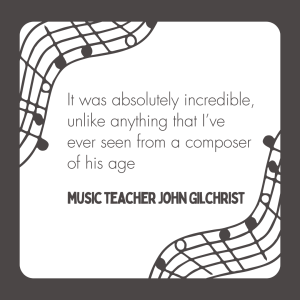 In the 2022 Pops Concert, William’s “Ascend” was played by the Chamber Orchestra, where he was also the conductor. William says that he reached out to Gilchrist about having his music played in a concert because he wanted to input his own voice into the music program at MVHS. Gilchrist, who was already familiar with William’s music, chose to accept the piece.
In the 2022 Pops Concert, William’s “Ascend” was played by the Chamber Orchestra, where he was also the conductor. William says that he reached out to Gilchrist about having his music played in a concert because he wanted to input his own voice into the music program at MVHS. Gilchrist, who was already familiar with William’s music, chose to accept the piece.
“One of the hardest things of the job is finding the right music that will be engaging for the audience, challenging for the musicians and feel fresh,” Gilchrist said. “And also, of course, elevating other voices of composers. It’s easy to just fall into programming the same few composers again and again and again. So it’s really great when we have younger composers writing music that we can perform.”
Encouraged by the acceptance, William adapted the motif from “WarZone” to write “Turbulent Souls,” which the Chamber Orchestra performed at MVHS’ annual Halloween-themed concert in October 2023, several months after “Ascend.” Gilchrist says “Ascend” is the more challenging one to play for the musicians out of the two.
“It’s very intentionally challenging, like, ‘This is going to be hard, and you’re going to struggle to play this,’” Gilchrist said. “There’s kind of a certain drama in that, I would say, when you see the musicians really trying to keep up with the technical demands of the music, and just chasing that constantly. It’s pretty impressive to see.”
William’s friend and sophomore Jay Zhang echoes the sentiment, adding that William’s pieces are so difficult to play that Jay expects even highly technically advanced musicians would have to practice for months in order to play through his compositions comfortably. In many pieces, William intentionally incorporates unconventional and potentially challenging aspects to grab people’s attention. He enjoys experimenting with chord progressions, which are successions of chords in a composition, as well as odd time signatures. The most common time signatures in music, 3/4 and 4/4, rarely appear in his pieces.
“If there’s a piece I want to have a unique entrance, if I use a different time signature then I can have more freedom with how I start,” William said.
After composing the entrance, William says he comes up with an overarching motif for the piece to be based on. One distinct aspect of William’s style is the ensemble of instruments he uses across many of his compositions: electric guitars, bass guitars, electric bass drum set and sometimes a piano or synthesizers are his go-tos. As for the structure of the music, William says he generally follows a set progression.
“At the beginning, it’s an introduction, and then there’s an exposition, development and recapitulation,” William said. “But there’s also a quiet section after all of the chaos in the beginning. Then after that quiet section, I gradually build up from there and I have a recap of the beginning, and then I just try my best at an ending.”
William’s compositions usually take him around a month to finish, and he likes to use Audacity, an audio editing app, to speed the piece up and down or play it backwards for fun. Jay, to whom William often sends drafts of his compositions to, says William’s style is uniquely his.
“It’s different from any other pieces,” Jay said. “I can’t tell what exactly. It’s one of those things that you can only know after you listen to it.”
William now plans to either attend a music conservatory or double major in music composition. He finds that his music writing hobby also functions as practice for a future career he would like to work in, potentially as a video game music or film score composer, and has applied to a few Boston music conservatories and other colleges with good music departments.
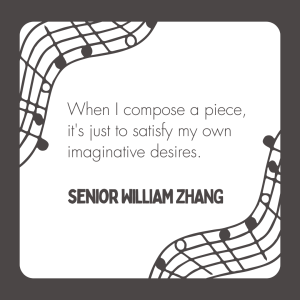 “When I compose a piece, it’s just to satisfy my own imaginative desires,” William said. “I wrote about writing in my Common App and how writing has developed my mind to be able to create more original stuff — how to not overuse tropes and stuff like that. I think it’s the same thing in music. I recently tried composing music for a game competition, and I got slammed by more popular music producers, but that was a cool experience because I was able to learn how to adapt to new concepts and new ideas, go out of my own style and try new things.”
“When I compose a piece, it’s just to satisfy my own imaginative desires,” William said. “I wrote about writing in my Common App and how writing has developed my mind to be able to create more original stuff — how to not overuse tropes and stuff like that. I think it’s the same thing in music. I recently tried composing music for a game competition, and I got slammed by more popular music producers, but that was a cool experience because I was able to learn how to adapt to new concepts and new ideas, go out of my own style and try new things.”




